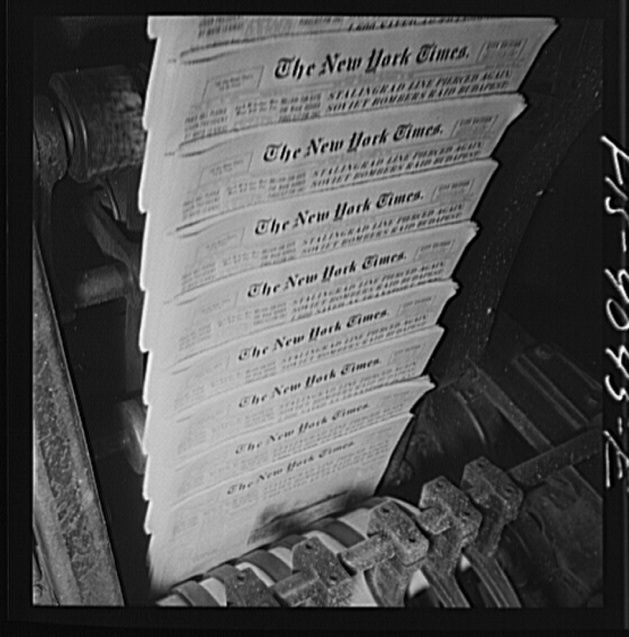
Public domain photo from 1924 or 1925
The New York Times’ purchase of The Athletic last year was starting to look ill-advised. The sports website continued to lose money after the Times paid $550 million for it, and it recently went through a round of downsizing. A new emphasis was announced: more trends and broad strokes, less coverage of teams and games.
Few, though, could have predicted what came next. Earlier today the Times said that it would actually do away with its own sports department and instead, in what you might call an act of internal outsourcing, turn over sports coverage to The Athletic — some of whose stories will now appear in the Times, both in print and online. It was a shocking move. Even though no one will be laid off, it marks the end of a small but high-quality operation that has won its share of Pulitzer Prizes over the years. Alexandra Bruell has the story for The Wall Street Journal (free link).
Speculation began to mount that such a move might be in the works over the weekend, when Ben Strauss of The Washington Post reported that the Times’ sports staffers had sent a letter to executive editor Joe Kahn and chair A.G. Sulzberger that said in part: “The company’s efforts appear to be coming to a head, with The Times pursuing a full-scale technological migration of The Athletic to The Times’s platforms and the threat that the company will effectively shut down our section.”
A Times spokesperson told the Post, “We’ll update when we have more to share.” Hours later, the hammer came down.
Although it’s hard to know exactly what Times management is thinking, you have to wonder if The Athletic’s status as a nonunion newsroom has something to do with it. Those of us with long memories can recall that some tensions were created when The Boston Globe launched Stat to cover health and life sciences — and stories from Stat, initially a nonunion shop, began running in the Globe, which, like the Times newsroom, is represented by a union. (Stat journalists joined the Boston Newspaper Guild in 2021.) Athletic publisher David Perpich told Bruell of the Journal that he’d respect a decision to unionize. Maybe so, but that’s generally not how it works.
The Times has been enormously successful at selling digital subscriptions, and The Athletic has been offered as part of its All Access offering — a higher-priced subscription that includes extras such as Cooking, the consumer-advice site Wirecutter and puzzles. It would appear, though, that The Athletic was not a major contributor to goosing those All Access subscriptions. And now this.
Tom Jones, a former sportswriter who’s now the media reporter for Poynter Online, expressed his misgivings just before the Times’ sports department was vaporized, writing:
It would be a real shame if Times leaders decided to alter the current Times’ sports section by cutting staff and/or integrating the coverage into The Athletic. They are two distinct sports outlets.
In a perfect world, both The Athletic and Times sports section would co-exist, each doing what they do best. For the Times, that’s deeply reported stories, superb writing and topics that you aren’t going to find routinely on most sports and/or news websites.
The Times is a juggernaut, the last great American newspaper that continues to grow and prosper. The idea that an outlet like the Times can’t support a sports section without a jerry-rigged system involving its own subsidiary is just absurd. This has all the appearance of a face-saving solution aimed at papering over its own poor decision to buy The Athletic in the first place.
Even if it seemed like a good idea to a lot of us at the time.












Two Alden papers, the Boston Herald and The Denver Post, will end commenting
By Dan Kennedy
On June 27, 2023
In Media
Royalty-free photo via Wallpaper Flare
At least two daily newspapers owned by Alden Global Capital’s MediaNews Group will end reader comments on July 1.
The Boston Herald announced the move earlier today, saying that the change was being made to “dramatically speed up the performance of the website” as well as on its mobile platforms. The Denver Post took the same action last week, although editor Lee Ann Colacioppo cited bad behavior rather than technology, writing that the comment section has become “an uncivil place that drives readers away and opens those trying to engage in thoughtful conversation to hateful, personal attacks.”
Both papers emphasized that readers will still be able to talk back at them through social media platforms.
Wondering if this were a MediaNews-wide action, I tried searching about a half-dozen papers in the 60-daily chain and could find no similar announcements. I found something else interesting as well. The eight larger dailies that comprise the Tribune Publishing chain, which Alden acquired a couple of years ago, are now included as part of MediaNews Group, although they are still listed separately as well. (A ninth, the Daily News of New York, was split off from Tribune and is being run as a separate entity.)
The moves by the Herald and the Post represent just the latest in the long, sad story of user comments. When they debuted about a quarter-century ago, they were hailed as a way of involving the audience — the “former audience,” as Dan Gillmor and Jay Rosen put it. The hope was that comments could even advance stories.
It turned out that comments were embraced mainly by the most sociopathic elements. Some publishers (including me for a while) required real names, but that didn’t really help. The only measure that ensures a civil platform is pre-screening — a comment doesn’t appear online until someone has read it and approved it. But that takes resources, and very few news organizations are willing to make the investment.
The best comments section I know of belongs to the New Haven Independent, where pre-screening has been the rule right from the start. Keeping out racist, homophobic hate speech opens up the forum for other voices to be heard. The New York Times engages in pre-screening as well.
So kudos to the Boston Herald and The Denver Post — and I hope other news outlets, including The Boston Globe, will follow suit.